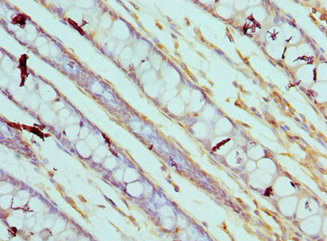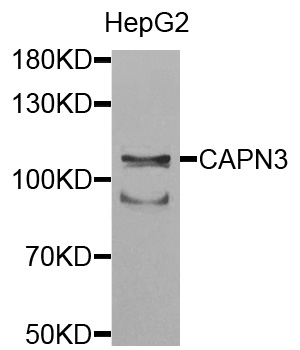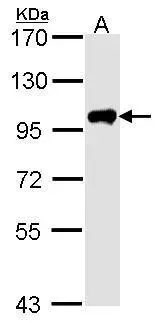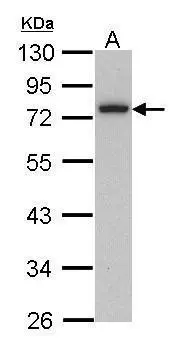![WB analysis of human skeletal muscle tissue lysate using GTX01970 Calpain 3 antibody [Calp3c/12A2] and GTX01970 Calpain 3 antibody [Calp3d/2C4]. Lane A : GTX01971 Lane B : GTX01970 WB analysis of human skeletal muscle tissue lysate using GTX01970 Calpain 3 antibody [Calp3c/12A2] and GTX01970 Calpain 3 antibody [Calp3d/2C4]. Lane A : GTX01971 Lane B : GTX01970](https://www.genetex.com/upload/website/prouct_img/normal/GTX01970/GTX01970_20200811_WB_88_w_23053121_582.webp)
WB analysis of human skeletal muscle tissue lysate using GTX01970 Calpain 3 antibody [Calp3c/12A2] and GTX01970 Calpain 3 antibody [Calp3d/2C4]. Lane A : GTX01971 Lane B : GTX01970
Calpain 3 antibody [Calp3c/12A2]
GTX01970
ApplicationsWestern Blot
Product group Antibodies
ReactivityCanine, Chicken, Hamster, Human, Mouse, Porcine, Rabbit, Rat
TargetCAPN3
Overview
- SupplierGeneTex
- Product NameCalpain 3 antibody [Calp3c/12A2]
- Delivery Days Customer9
- Application Supplier NoteWB: 1:100. *Optimal dilutions/concentrations should be determined by the researcher.Not tested in other applications.
- ApplicationsWestern Blot
- CertificationResearch Use Only
- ClonalityMonoclonal
- Clone IDCalp3c/12A2
- ConjugateUnconjugated
- Gene ID825
- Target nameCAPN3
- Target descriptioncalpain 3
- Target synonymsCANP3, CANPL3, LGMD2, LGMD2A, LGMDD4, LGMDR1, nCL-1, p94, calpain-3, calpain p94, large [catalytic] subunit, calpain, large polypeptide L3, muscle-specific calcium-activated neutral protease 3 large subunit, new calpain 1
- HostMouse
- IsotypeIgG2a
- Protein IDP20807
- Protein NameCalpain-3
- Scientific DescriptionCalpain, a heterodimer consisting of a large and a small subunit, is a major intracellular protease, although its function has not been well established. This gene encodes a muscle-specific member of the calpain large subunit family that specifically binds to titin. Mutations in this gene are associated with limb-girdle muscular dystrophies type 2A. Alternate promoters and alternative splicing result in multiple transcript variants encoding different isoforms and some variants are ubiquitously expressed. [provided by RefSeq, Jul 2008]
- ReactivityCanine, Chicken, Hamster, Human, Mouse, Porcine, Rabbit, Rat
- Storage Instruction-20°C or -80°C,2°C to 8°C
- UNSPSC41116161







![WB analysis of human skeletal muscle tissue lysate using GTX01970 Calpain 3 antibody [Calp3c/12A2] and GTX01970 Calpain 3 antibody [Calp3d/2C4]. Lane A : GTX01971 Lane B : GTX01970](https://www.genetex.com/upload/website/prouct_img/normal/GTX01971/GTX01971_20200811_WB_89_w_23053121_581.webp)